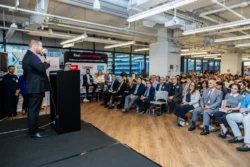Dean Detlev Zwick’s Interview Featured in Poets & Quants

Republished with Permission from Poets & Quants
As a marketing professor, Detlev Zwick built a career exploring how technology changes relationships: between people, between people and things, and how new things are created. His dissertation in the late ’90s explored how the internet made the stock market an online object, making trading seem more like gambling. He’s since written on the rise of data infrastructures, marketing automation, and how technology transforms how marketers do their jobs.
Yet, when COVID-19 arrived, the tech-focused academic reached out to some even more tech-savvy colleagues with a question that seems almost quaint by today’s standards: ‘What’s up with Zoom?’”
Just about a week later, York University’s Schulich School of Business was locked down along with other Canadian schools and businesses. As the school’s associate dean of academics at the time, Zwick led the school’s pandemic-era switch to online learning.
Today, Zwick is leading Schulich through a new technological transformation, one that is arguably even more disruptive than the internet or the Covid pivot: Artificial intelligence.
“Around 2018, I started to realize we were entering a new world. We were still dealing with data, but now it was individualized and being acted upon in real time. That’s when I understood that something fundamental was changing,” says Zwick who has served as Schulich’s dean since 2021.
“But ChatGPT? That caught me off guard.”
Q&A WITH DETLEV ZWICK
Located in Toronto’s thriving entrepreneurial ecosystem, Schulich has long been an innovator in business education. It launched one of the first Master’s in Business Analytics degrees over a decade ago and was offering business ethics and sustainability programs in the early 1990s. It launched a Master of Management in Artificial Intelligence in 2019, three years before ChatGPT went public and astonished pretty much everyone.
In 2023, it launched its MBA in Technology Leadership, the first of its kind in Canada, emphasizing practical skills through guaranteed internships and direct industry exposure. It was also a North American pioneer in offering one-year, specialized Master’s programs and now has one of the largest portfolios – from Accounting to Health Industry Administration, from Supply Chain Management to Real Estate & Infrastructure.
It is among Canada’s highest ranked business schools, with programs across all academic levels. It offers a variety of MBAs including its flagship full-time program, MBA/Juris Doctor, MBA/Master of Fine Arts, and a distinguished EMBA partnership with Kellogg School of Management. Why the school is actively exploring ways to make business education more flexible, it offers no fully online programs.
“We don’t believe management education can truly be delivered without physical presence,” Zwick tells P&Q. “Business is ultimately about relationships and trust.”
Born in Germany, Zwick joined Schulich as an assistant professor of marketing in 2002. He became interim dean in July 2020 at the height of COVID after the school’s longtime dean, Dezsö Horvath, stepped down after 32 years. Zwick became full-time dean in summer of 2021, though he wouldn’t actually get to see his new office for 15 months.
Poets&Quants recently caught up with Zwick to talk about how Schulich is responding to the latest digital transformation, the future of the MBA, and how Toronto’s tech scene is driving a new wave of Schulich entrepreneurs. Our conversation has been edited for length and clarity.

What kind of foundation did Dean Horvath leave after 32 years? What do you believe Schulich was known for, and what were your priorities when you stepped in as dean in 2021?
Over his three decades, Dean Horvath built Schulich into a global brand. We inherited a strong foundation, but we also knew there were things we had to update and upgrade.
This brings me back to my focus on technology. I’m not a technologist or an engineer, but I study the impact of new technologies on practices, especially in marketing. One of the things I had already observed, even before becoming dean, was the growing digital disruption in education and particularly in management education.
We were already seeing new players coming online, offering high-quality courses and assembling them quickly. Certificates were emerging. Degrees hadn’t quite entered the space yet, but it was clearly just a matter of time. So I’d been watching this trend closely, and when our new leadership team came in, it became one of the major topics we had to address.

Something I learned from Dean Horvath was, “Don’t play chess with Kasparov.” In other words, “Don’t play games you can’t win.” And Schulich can’t win the game of mass online delivery of management education. So we decided early on that we wouldn’t play it.
We don’t believe management education can truly be delivered without physical presence – without students sitting in the same room, engaging in breakout discussions, learning how to resolve disagreements, and developing emotional and contextual intelligence. These things can’t be replicated digitally, no matter how good the tech gets.
Business is ultimately about relationships and trust. That’s been true for 10,000 years, from ancient marketplaces to tech founders sitting in backyards with investors. It’s about whether people click. And you need real, human interaction to develop that.
So our response to digital disruption has been to double down on student experience. We want to create value from the moment a student applies. About 50% of our graduate students are international, so we put a lot of focus on helping them settle in and develop personally and professionally from day one.
We’ve also strengthened our program portfolio to ensure we’re meeting students’ real needs and interests. In 2023, we added two new programs: the Master of Health Industry Administration and the MBA in Technology Leadership, both aligned with our emphasis on technology and entrepreneurship.
When you were studying how the internet was impacting people and marketing in the late 1990s and 2000s, did you ever imagine the kind of changes we’re seeing today with AI? Was that on your radar, or does today feel dramatically different from that earlier period?
The honest answer is, not really. Not the kind of AI we’re seeing now.
I was very aware of the evolution of data analytics. For about three or four years, I spent a substantial amount of time working with a boutique data science consulting firm that worked with brand managers to help make sense of this new world of data. So I had some early exposure, probably earlier than most. One of my dissertation interviews, back in 1998 or 1999, was with a woman who had a PhD in psychology and had just been hired by this firm. She told me how she worked with McDonald’s, helping them make sense of what, at the time, felt like massive amounts of data. Today we’d probably laugh at those numbers, but then it was cutting-edge. That conversation stuck with me and pulled me deeper into that space.
Still, the leap to where we are now – with real-time data manipulation and automation – took longer to hit me. Around 2018, I started to realize we were entering a new world. We were still dealing with data, but now it was individualized and being acted upon in real time. That’s when I understood that something fundamental was changing.
But ChatGPT? That caught me off guard.

And yet, Schulich launched a Master of Management in Artificial Intelligence in 2019, three years before ChatGPT went public.
That’s true. Innovation is part of Schulich’s DNA. Our tagline – “global, innovative, diverse” – has been around for 30 years, and we’ve stuck with it because it still reflects who we are.
Over the last 15 years, Schulich has seen significant program innovation. We now offer nine one-year master’s programs, making ours one of the largest professional master’s portfolios in North America. We were first in North America to launch a Master of Business Analytics, around 2012 or 2013.
That said, the Master of Management in AI didn’t really take off in the early years. When I became dean, we looked at the numbers and considered merging it with the Master of Business Analytics. But then ChatGPT happened. The landscape shifted.
Let’s dive a little deeper into the MBA in Technology Leadership. Is that an MBA specialization, or is it a separate program?
It’s a separate MBA.
We also offer our traditional MBA program. If you asked me what that MBA stands for, I’d say options and choice. The core curriculum is fairly similar to what you’d find in any accredited MBA program, but in the second half, students can choose from 16 different specializations.
If you’re interested in arts and media, we’ve got a specialization for that. We have one in sustainability, we have one in entrepreneurship. We even have one in mining. Right now, digital transformation is actually our most popular specialization (and we’ll probably rename it to AI soon, because that’s what everyone wants to talk about.)
The Tech MBA was our way of putting a stake in the ground and saying, “This is our strength.”
For a long time now, our researchers – whether in marketing, supply chain, finance, or strategy – have been doing world-class work in technology-related areas, including AI and digital transformation. We had already built two highly successful one-year professional master’s programs focused on tech. And while we’re not training coders, we are training management students with a deep understanding of the tech landscape.
We have the teaching strength. We have the research strength. And we have Toronto.
Our external analysis confirmed that Toronto has become a global tech innovation hub over the past 10 to 15 years. It’s one of the fastest-growing startup regions in North America. Now, with AI, we’re seeing even more startups emerge around AI-driven ideas. So we wanted Schulich to be the place where future executives go to learn how to lead digital and AI transformations, and to think about technology not just as a tool, but as strategy.
That’s how we developed the Tech MBA. It’s a very exciting program for us and a clear signal of our emphasis on becoming a leader in technology-focused management research and teaching.
How does your Tech MBA compare in size to your full-time MBA?
In the first year, we deliberately kept the cohort to 15 students. That’s by design.
Even though the Tech MBA is only in its second iteration, we’re already working on a completely new concept for the third year. So, our goal for this fall is 20 students. Ultimately, I think we’ll land somewhere between 35 and 50 per cohort. The program director has ambitious goals, and he thinks this could become our main MBA program.
But we’re realistic. The MBA as a degree category is in overall decline. That said, along with Rotman, we still have the largest MBA enrollment in Canada, with about 210 to 250 students.
So compared to that, the Tech MBA is a niche program, and that’s intentional. It’s high-touch and complex to deliver. There’s a lot of experiential learning built in: students spend an entire term in a Venture Lab, they work on company projects, and they participate in internships. It’s not a program you can easily scale.

You mentioned Toronto’s growing role as a tech innovation hub. Tell me more about Schulich’s entrepreneurship ecosystem and the kinds of resources available to students.
One of the decisions we made during COVID was to ramp up our investment in entrepreneurship. I felt it was essential and is something I care deeply about.
We opened the Office of Innovation and Entrepreneurship in fall 2020. We’re now tracking around 250 Schulich student- and alumni-led startups. The ecosystem is growing incredibly fast.
We’re starting to see major venture capital firms pay attention and get connected. We just secured funding to endow a chair position, and the government recently awarded us more than $3 million to grow the Schulich Venture Academy.
And what is that?
The academy brings in founders from across Canada for eight to 10 masterclasses taught by top Canadian founders and VCs. It is designed to help founders scale their ventures faster. About 140 founders have already gone through it, funded by small tuition fees just to cover costs.
Now, with the government support, we’ll be able to bring in around 100 founders each year for the next five years. So, the program will eventually support around 500 companies, all of them connected to the broader ecosystem we’ve built.
We’ve also added entrepreneurship specializations in the MBA, undergraduate program, and in our Master of Management. These specializations are possible because of what we’ve built through the Office of Innovation and Entrepreneurship and the new experiential education opportunities it supports.
This entrepreneurial ecosystem has become a major pillar of the school. The energy has changed. Students now want to come to Schulich specifically because they want to be part of it.

How does this entrepreneurship focus connect to your broader vision for the future of management education?
I think this is exactly the kind of response that’s needed in the face of digital disruption and AI. If you ask me what the future of management education looks like, I’d say it’s not just AI. Yes, we use AI extensively – we’re incorporating it across operations, and we teach it in classrooms.
But, a comprehensive management education needs more than technical tools. It needs close partnerships with industry, an entrepreneurial mindset, and relevance.
We know that the careers our students pursue will be transformed by AI. Boston Consulting Group, for example, might not hire 100 graduates anymore, they might hire 10. So what will the other 90 do? They’ll pursue different career paths.
It’s why I believe the MBA is still one of the best degrees you can earn. It trains you to solve complex problems, make sound executive decisions, lead teams, and think critically. To stay relevant, the MBA must evolve, and the best way to do that is by staying close to industry. By understanding where it’s going, and working with partners to ensure the talent we’re developing is prepared not just for the roles of today, but also for the ones we can’t yet imagine five or seven years from now.
Do you think AI will ultimately be a net positive or net negative for the MBA? Will the degree evolve to train people for a broader range of jobs beyond traditional paths like consulting and finance?
So that is the $60 million question. I’ve probably asked this question, or variations of it, to my team so many times over the last four years they probably can’t hear it anymore.
The answer I want to believe right now is slightly informed, I hope, by my 20–25 years of researching technology and its impact. I think the MBA, if anything, is not just going to survive; I think it will actually keep thriving.
Yes, people say it’s a mature category. And yes, in North America, it’s in slight decline. But in other parts of the world, like China, the scale is just mind-boggling. When you talk to the dean at Fudan, they’re not talking about MBA decline; They’re talking about massive growth.
At the core, what we teach in the MBA are not just technical skills. We teach how to think, how to grow, how to ask questions, how to listen to answers, how to build relationships, how to lead teams. These are durable skills, and they’re always going to be needed.
Every time a disruptive technology comes along, some jobs are displaced. It was carriage drivers when cars arrived. It was people plowing fields when tractors came. Maybe it’ll be consultants this time. That’s the nature of change: People will be displaced. But entirely new fields will open up.
And for that, we’ll need MBAs.
It’s easy to look at it and think, “Oh my God, there won’t be any jobs. What are we going to do with management education in the age of AI, when students just learn from a hologram?” Quite the opposite could be true: the age of AI might actually usher in a real renaissance of something like an in-person, high-touch MBA program.

How is Schulich incorporating AI into its programs?
We have a “super course” on AI and machine learning. (Our super courses are open to every student at Schulich, across all programs). It’s structured around practical applications across industries, so each of the 12 sessions brings in a different expert on the use of AI in supply chain, in marketing, in finance, and so on. It’s like a masterclass on how AI is transforming that field right now.
In April, we unveiled the new AI-powered BMO Future Leaders Finance Lab. Our students will soon receive subscriptions to tools like ChatGPT so they can learn to use them effectively.
We’re using AI operationally as well. One example is our AI-powered mentorship platform. We have 35,000 alumni around the world, and we wanted to unlock that. Students complete a series of onboarding steps through our Center for Career Design, then they’re placed on the platform where they can find a mentor aligned with their goals, whether they plan to stay in Canada or return home. Thousands of alumni have already signed up as mentors.
Our careers office also has an AI coaching tool that helps students prep for case analysis, job interviews, and so on. But, interestingly, when we looked at the usage stats last week, students still prefer in-person coaching. They like sitting down with someone face-to-face.
So again, I think we need to keep a close eye on how this “AI magic” actually unfolds. Generative AI is real, and there are amazing things happening, but I also believe that humans still want humans. Business is about humanity and relationships.
Do you think the Trump administration’s attacks on things like international students, DEI, and academic freedom opens a door for Canadian business schools like Schulich? Should Schulich roll out the welcome mat to international students (even from perhaps the U.S.) more explicitly?
At least currently, I think we’ll probably see some benefits in Canada. However, we are facing our own slowdown in visa approvals as part of a broader government effort to slow the influx of international students and immigration more generally. For Canada, that’s a bit new, and I don’t think it’ll last long. It’s temporarily affecting the growth of programs like the Tech MBA.
Canada has historically been one of the top four destinations for international students along with the U.S., the UK, and Australia. So, will we eventually benefit from what’s going on in the U.S. right now? I believe so.
That said, what’s happening in the U.S. is very hard to pin down. Things can change overnight. Don’t forget, during the campaign, President Trump floated the idea that every graduate from a U.S. university should automatically get a green card. That probably came from a good place, maybe after conversations with tech innovators who were telling him that the U.S. was bringing in the world’s top engineers and educating them, but making it hard for them to stay and build companies.
That’s not that far removed from what Canada already does really well. We bring in talented people from around the world, provide a world-class education (often more affordable than in the U.S.) and then make it possible for them to stay and work here. It’s one of our biggest strengths as a country and certainly helps attract top talent to Schulich.
But again, if Trump changes his mind and reintroduces something like the green card idea, we have to be honest: the U.S. is still the number-one destination for international students. It’s just not right now, because of how difficult it is to get in and the shifting political mood.
Overall, though, I’m very optimistic about Canada. Toronto is an incredibly welcoming place, and many international students already have family or community networks here. That creates an amplifier effect.
As for DEI and sustainability, I’d say we’re a lot less affected by the intensity of the backlash we’re seeing in the U.S. Diversity has literally been part of our school’s slogan for the past 35 years. It applies to our faculty in terms of background, research methodologies, research interests, and intellectual perspectives. It applies to our students’ interests and worldviews.
So from where I sit, what’s happening in the U.S. doesn’t feel like our battle to fight. We watch it with a bit of horror, to be honest. But here at Schulich, we remain absolutely committed to diversity, inclusion, and sustainability. These aren’t political issues for us.
Anything else you’d like to add?
Another thing I’d add is flexibility in how students earn their degrees. This is becoming a major challenge, especially in global cities like Toronto.
Twenty-five years ago, you could get an MBA in Canada for $10,000. People would quit their jobs, study for two years, then go back to work with a higher salary. That world is gone. Now, tuition is closer to $100,000. Housing is unaffordable. Students have mortgages. They can’t just pause their lives for two years and take on that kind of debt.
So we’re seeing increased demand for flexibility, especially among domestic students. We’ve responded by adding part-time options, evening and weekend courses, and even remote courses. We do not offer fully online programs, but offer options that reduce the need to commute.
Models like Kellogg-Schulich Executive MBA are also becoming more relevant. That program has been running successfully for over 20 years. Students work during the week and come in on weekends. That model might actually inform the future of many of our programs.
Our one-year master’s programs were designed for students in their early 20s with no full-time jobs, just focused study. And many still do that. But more and more students want to do these parttime, too, which surprised us. We have to respond to that shift.
At the same time, international students often want full-time, two-year MBAs and aren’t interested in working while studying. So flexibility means different things to different groups. Balancing all of that is the next big challenge we’re thinking about.